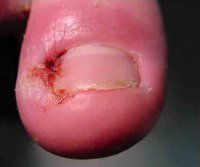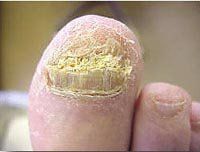TOENAIL DISORDERS
Toenail Disorders
Ingrown Toenails
Ingrown toenails
(onychocryptosis) is a common problem that Dr. Sheff treats on a daily basis. Often if left untreated, the toe may become infected (paronychia), which is not only very painful but also potentially dangerous, as the underlying bone is susceptible to infection as well.
What causes a nail to become ingrown?
There are several causes of an ingrown toenail. Wearing shoes that are too tight is a common culprit in women. Improper nail trimming is another common cause, more often seen in men as well as adolescents who trim their nails. However, sometimes a toenail will become ingrown simply because, well, that's how it grows. This can be due to prior injury to the toe or may reflect a genetic propensity.
Treatment
When a nail is ingrown and infected, Dr. Sheff removes the part of the nail that is causing the pain and infection. Usually, the patient has pain relief that day, and sometimes they will also be placed on an antibiotic (depending on their overall health as well as the severity of their infection). For those who have ingrown toenails over and over because, as mentioned earlier, they grow that way, there is a simple procedure that Dr. Sheff performs in his office under local anesthesia that can cure the problem by removing the piece of toenail permanently.
Toenail Fungus
Fungal toenails (onychomycosis) is an infection of the nail as well as the portion of the toe where the nail grows from, called the nail matrix. There are several different types of toenail fungus. Each causes discoloration of the nail and often thick nails that are difficult to trim, prone to infection, as well as painful. A common misconception is that the problem is the result of poor hygiene, but the truth is that even the most fastidious person can catch this problem, as it is nothing more than an infection. There are many things you can do to prevent toenail fungus. If you use public showers, public swimming pools or public locker rooms, be sure to wear flip flops to avoid contact with the bare floor. Always be sure to keep your feet dry as well, as fungi need darkness and moisture to grow, so if your feet sweat a lot, or if you do not dry thoroughly and then put socks and shoes on, you have created a perfect environment for the fungus to grow.
Treatment
There are several FDA approved oral as well as topical medicines that Dr. Sheff often will prescribe to treat toenail fungus. There are also minor nail surgeries that Dr. Sheff performs under local anesthesia in the office. These treatments have proved extremely effective in treating this annoying, painful, and cosmetically unappealing problem.
If you are experiencing toenail pain or fungus, contact us today at 401-846-8050
to schedule an appointment.
Some cause happiness wherever they go; others, whenever they go.
- Oscar Wilde
Browse Our Website
Our Location
Content, including images, displayed on this website is protected by copyright laws. Downloading, republication, retransmission or reproduction of content on this website is strictly prohibited. Terms of Use
| Privacy Policy







